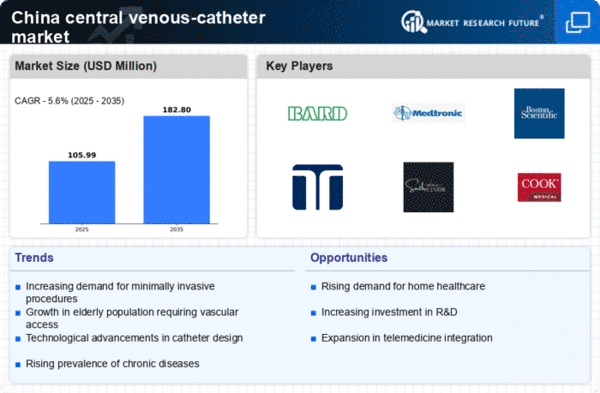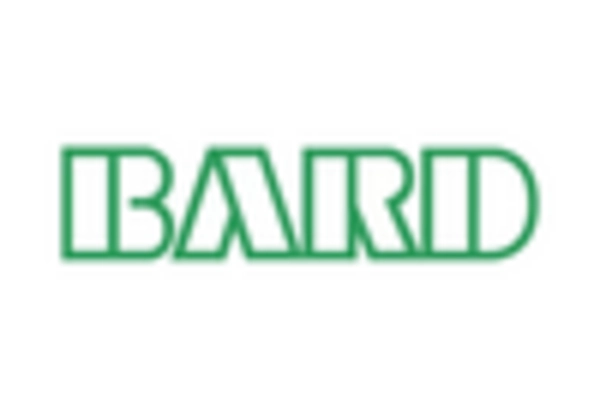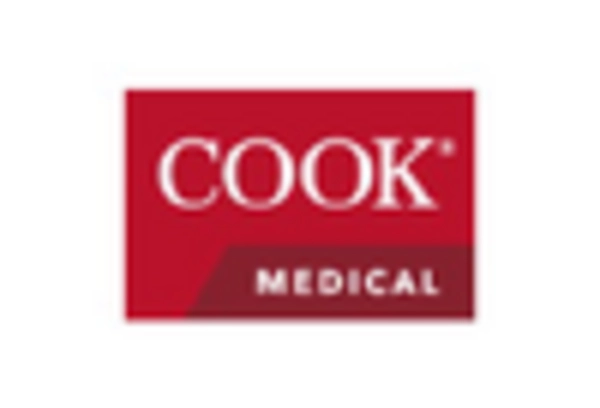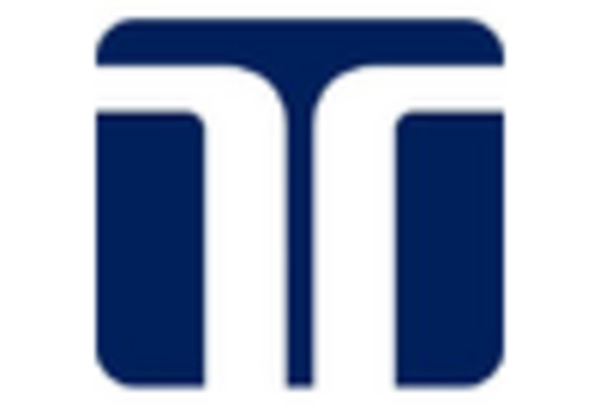Rising Healthcare Expenditure
The upward trend in healthcare expenditure in China is a significant driver for the central venous-catheter market. As the country invests more in healthcare services, the demand for advanced medical devices is expected to increase. Reports indicate that healthcare spending in China has been growing at an annual rate of approximately 10%, reflecting a shift towards more comprehensive healthcare solutions. This increase in expenditure allows healthcare providers to invest in high-quality medical devices, including central venous catheters, which are essential for effective patient care. As hospitals and clinics expand their services and improve their facilities, the central venous-catheter market is likely to benefit from this growing financial commitment to healthcare.
Advancements in Medical Technology
Technological innovations play a crucial role in shaping the central venous-catheter market. Recent developments in catheter design, materials, and insertion techniques have enhanced patient safety and comfort. For instance, the introduction of antimicrobial coatings and ultrasound-guided placement techniques has significantly reduced infection rates and complications associated with catheter use. The market is projected to grow as hospitals and clinics adopt these advanced technologies to improve patient outcomes. Furthermore, the integration of smart technologies, such as sensors for monitoring catheter function, is likely to drive future growth. As healthcare facilities in China increasingly prioritize patient-centered care, the demand for technologically advanced central venous catheters is expected to rise, reflecting a shift towards more effective and safer medical practices.
Government Initiatives and Funding
Government support and funding initiatives are pivotal in driving the central venous-catheter market. The Chinese government has implemented various healthcare reforms aimed at improving access to medical devices and enhancing healthcare infrastructure. Increased funding for hospitals and healthcare facilities facilitates the procurement of advanced medical technologies, including central venous catheters. Additionally, public health campaigns aimed at raising awareness about chronic diseases and their management further stimulate market growth. The central venous-catheter market stands to gain from these initiatives, as they promote the adoption of essential medical devices in clinical settings. With the government's commitment to improving healthcare quality, the market is likely to experience sustained growth in the coming years.
Growing Awareness of Infection Control
The heightened awareness of infection control measures among healthcare professionals is influencing the central venous-catheter market. Infections related to catheter use pose significant risks to patients, prompting a focus on best practices for prevention. Training programs and guidelines aimed at minimizing infection rates are becoming more prevalent in healthcare settings across China. This shift towards stringent infection control protocols is likely to drive the demand for advanced central venous catheters designed with safety features, such as antimicrobial properties. As healthcare providers prioritize patient safety and strive to reduce hospital-acquired infections, the central venous-catheter market is expected to expand, reflecting a commitment to improving healthcare quality and outcomes.
Increasing Incidence of Chronic Diseases
The rising prevalence of chronic diseases in China is a primary driver for the central venous-catheter market. Conditions such as cancer, diabetes, and cardiovascular diseases necessitate long-term intravenous access for treatment. According to health statistics, chronic diseases account for approximately 80% of all healthcare expenditures in the country. This trend indicates a growing need for effective management solutions, including central venous catheters, which facilitate prolonged therapies. As the population ages and lifestyle-related health issues become more common, the demand for these medical devices is expected to escalate. The central venous-catheter market is likely to benefit from this increasing incidence, as healthcare providers seek reliable methods to administer medications and fluids to patients with complex health needs.
















